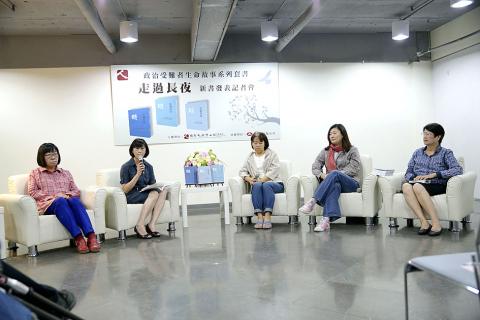Long Night’s Journey (走過長夜), an anthology of the accounts of 57 Taiwanese political prisoners and victims of state repression during the White Terror era, was released yesterday by the Preparatory Office of National Human Rights Museum.
The White Terror era describes the suppression of political dissidents and public discussion of the 228 Incident under martial law from May 19, 1949, to July 15, 1987.
At a press conference held to introduce the collection, four family members of White Terror era victims shared their stories.

Photo courtesy of the Preparatory Office of the National Human Rights Museum
Political prisoner Wu Yih-min’s (吳逸民) daughter, Wu Wen-hui (吳文慧), said her father was a National Taiwan University economics student when he was of convicted of anti-government activity by the then-National Security Bureau and imprisoned for 13 years.
She said her father did not speak much about his experiences as a political prisoner until last year, during a family trip to the former Alcatraz federal penitentiary in San Francisco, US, when Wu family members said they were shocked at the violation of human rights that took place there.
She said her father’s responded, “Alcatraz is very nice in comparison” to the prison he had been in Taiwan during the White Terror era.
According to Wu Wen-hui, her father’s greatest regret was never having received his economics diploma due to his incarceration.
“His youth was burned away in prison,” she said.
Wu Wen-hui said her father remained upset to the end of his life that the archives recording the events of White Terror era had not been opened to the public.
“There should be transparency and truth so that Taiwanese can know the past and learn from it,” she said.
Former political prisoner and veteran democracy activist Shi Ming-teh’s (施明德) daughter, Teresa Shih (施又熙), said that in the past few years historians working on the White Terror era have shifted their focus from the victims’ own experiences to that of their families.
Citing a statement from Yang Pi (楊碧), daughter of White Terror era victim Yang Kui (楊逵), Teresa Shih said that as the family member of a victim of state repression, “not only you are afraid of others, but others were also terrified of you.”
“The family members of White Terror victims were rejected and isolated by society,” Teresa Shih added.
Huang Hsin-hua (黃新華) said she knew little of her father, Huang Hsien-chung (黃賢忠), who was executed at the age of 33.
Her mother was also a political prisoner who gave birth to her behind bars.
“I knew nothing about my father until his last will and testament — which was withheld by the government for 60 years — was given to me,” she said, adding: “When I gave the letter to mother, she had no words and just sighed deeply.”
“How many 60 years does a person have in a lifetime?” she asked, tearing up.
Ouyang Hui-mei’s (歐陽煇美) father, Ouyan Wen (歐陽文), was a noted painter and a student of renowned painter and 228 Massacre victim Chen Cheng-po (陳澄波).
She recalled that her father had trouble supporting his family, after being released from prison, and only recently began making art again “to show to the world that Taiwanese have always, and will always strive to realize human rights and liberty.”

Nipah virus infection is to be officially listed as a category 5 notifiable infectious disease in Taiwan in March, while clinical treatment guidelines are being formulated, the Centers for Disease Control (CDC) said yesterday. With Nipah infections being reported in other countries and considering its relatively high fatality rate, the centers on Jan. 16 announced that it would be listed as a notifiable infectious disease to bolster the nation’s systematic early warning system and increase public awareness, the CDC said. Bangladesh reported four fatal cases last year in separate districts, with three linked to raw date palm sap consumption, CDC Epidemic Intelligence

The manufacture of the remaining 28 M1A2T Abrams tanks Taiwan purchased from the US has recently been completed, and they are expected to be delivered within the next one to two months, a source said yesterday. The Ministry of National Defense is arranging cargo ships to transport the tanks to Taiwan as soon as possible, said the source, who is familiar with the matter. The estimated arrival time ranges from late this month to early next month, the source said. The 28 Abrams tanks make up the third and final batch of a total of 108 tanks, valued at about NT$40.5 billion

Two Taiwanese prosecutors were questioned by Chinese security personnel at their hotel during a trip to China’s Henan Province this month, the Mainland Affairs Council (MAC) said yesterday. The officers had personal information on the prosecutors, including “when they were assigned to their posts, their work locations and job titles,” MAC Deputy Minister and spokesman Liang Wen-chieh (梁文傑) said. On top of asking about their agencies and positions, the officers also questioned the prosecutors about the Cross-Strait Joint Crime-Fighting and Judicial Mutual Assistance Agreement, a pact that serves as the framework for Taiwan-China cooperation on combating crime and providing judicial assistance, Liang

A group from the Taiwanese Designers in Australia association yesterday represented Taiwan at the Midsumma Pride March in Melbourne. The march, held in the St. Kilda suburb, is the city’s largest LGBTQIA+ parade and the flagship event of the annual Midsumma Festival. It attracted more than 45,000 spectators who supported the 400 groups and 10,000 marchers that participated this year, the association said. Taiwanese Designers said they organized a team to march for Taiwan this year, joining politicians, government agencies, professionals and community organizations in showing support for LGBTQIA+ people and diverse communities. As the first country in Asia to legalize same-sex